Senior Spotlight: Luke Pesce and Joe Park
November 25, 2020
Accomplishments and success pervade the class of 2021. Despite the unprecedented challenges that this year’s senior class has faced, they continue to make the most of their final year of high school. Therefore, I believe that it is crucial to highlight the immense achievements of the class of 2021. I spoke with Luke Pesce and Joe Park, the leaders of Junior State of America, to reflect on their high school experiences and discuss their evolution as leaders, students, and as individuals.
Luke Pesce
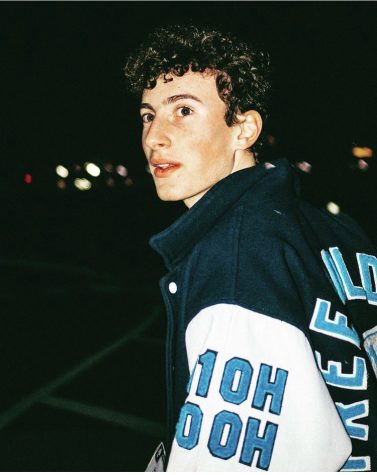
Luke Pesce’s aspirations for his time in high school have been to delve into every opportunity that is presented to him at Freehold Township. He has undoubtedly reached this, demonstrated by his extensive list of extracurriculars. Luke continuously seeks to challenge himself, desiring to broaden his perspectives and deepen his wide variety of interests.
Read the full interview below:
Olivia Naum: What would your ideal vacation look like?
Luke Pesce: Probably somewhere in western Europe. I go to Italy very often, so going somewhere like Germany or France would definitely be somewhere a little different but also somewhere similar to Italy.
ON: What movie have you watched the most?
LP: Definitely Goodfellas. I love Italian mob movies. I know it’s a similar thing to Italian stuff but I love mob movies and Goodfellas is probably one of the best movies I’ve ever watched.
ON: If you could have dinner with any historical figure, who would it be?
LP: Let me think about this one. I think it would probably be an artist, someone like, I guess, John Travolta- or like an actor because I always wanted to get into acting. So, I always like to ask those kinds of questions.
ON: Any other facts that you think we should know about you?
LP: I speak Italian. I’m six foot two. I’m a volunteer firefighter.
ON: That’s cool! Explain that more to me, what does that entail?
LP: So, my dad’s actually a firefighter in New York City. I always wanted to try something like that. I’m actually a junior firefighter in Englishtown. I go there at least once a week and I spend at least three or four hours there and I drill and practice on firetrucks, drills, CPR training, different fire rescue techniques, and if I’m ever there when a fire call goes out then I’ll hop on the truck with some other guys and we’ll go respond to an emergency. It’s really exciting, it can be really- you get a lot of adrenaline out of it, especially when there’s a call and you have to get on a truck and really get there quickly. So, there’s a lot that goes into it.
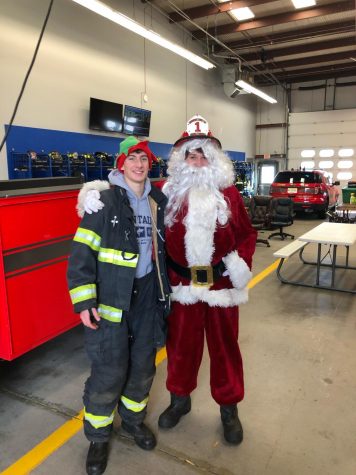
ON: How would you describe your high school experience in one word or phrase? Explain your answer.
LP: I think the best word would be broad. I think that’s because when I entered high school I really made it part of my goal to within four years to explore as much as I could about high school and every aspect that was given to me because there were so many opportunities here. First year I did soccer, I did three seasons of sports. I did soccer, winter track, and spring track. Then I also signed up for JSA in my first year. I also continued to do soccer through sophomore year. I tried the musical junior year. I did Italian Honors Society and obviously Global Studies, which is something I obviously came into the high school to do. And I don’t know, I did some other small stuff as well. I always wanted to try different things and make sure I got every aspect and see really what I liked. So when I left high school, even though I’m still in there, when I left, I kind of had a better picture of what I liked and didn’t.
ON: So what do you think you’ve learned about yourself from these different activities. What is it that you like and don’t like?
LP: I definitely like something that is challenging, I never liked something that was quick and easy. I always want to do something more, something that I can accomplish, whether that be through track, gold medals, winning races, some sort of gratification at the end of a lot of work. Track practice was tough, I’m not going to lie, like I threw up, it gets really rough at some points. But I have my medals on my wall, I’m really proud of it. Acting in the high school musical, there’s a theater, Count Basie Theater, that gives out reviews and my first review was just as satisfactory, which is kind of the average level line. But I worked during the musical and I got an excellent rating, so it’s some sort of gratification. And obviously as JSA president, that’s also something that I’ve been able to work towards in four years.
ON: What was one of your favorite memories from high school so far?
LP: Once again, they all have to do with extracurriculars, mostly. Not to say that my average high school experience was bad. They were just, crazy moments that happened. I vividly remember during winter track, our relay team, consisting of me and three of my friends, in Global Studies actually. We won, it was freezing cold outside, it must have been like twenty degrees. And I was in like, short shorts, and a t-shirt, and I was so cold but we won this race in like a blow-out margin and we were just jumping up and down in the cold, like freezing. I was so happy about that. And I also had so many experiences with JSA that I’ve enjoyed, I mean, I won a best speaker gavel, I was really proud of that. And soccer, I’ve had a couple of moments.
ON: It’s great when you work so hard for something and you’re able to see that result.
LP: Yes, definitely. The gratification, from something like that, is something that I’ll never forget. Especially when you work so hard and you put so much effort in. I mean, the results of getting something easy are never satisfying, as when you work so hard for something. You really, really value it.
ON: That’s so true. As you know there’s a significant number of JSA members who are also in Global Studies. So, what aspects of your personality allow for both of these programs to be appealing to you?
LP: Well, I’ve alway seen JSA as an extension of Global Studies. Even though, sometimes, I feel like I shouldn’t because it’s a club for the entire school. When I came in freshman year, I saw students in Global Studies who were seniors, who were really knowledgeable and really confident when they were speaking about different subjects and they really gave me a lot of perspective. Since then, I’ve learned so much from those people who are older than me in Global Studies that I’ve been able to collect that and learn from that and extended what I’ve learned from JSA into Global Studies. That whole political aspect of my high school education has been really fulfilling. And so now I’m a senior and I’m in the spot where I was looking up to kids, like four years ago, and I feel like it’s my responsibility to do the same thing and try to talk to freshmen and talk to sophomores and teach them what my seniors taught me. That’s where I’ve gone.
ON: What’s something that you try to teach freshman that you’ve learned and feel is something super important to share?
LP: Definitely, tolerance and respect. Especially now, in 2020, where the political climate is so shaky. I feel like people should really take in every account and understand every point of view because it’s so tough to do that nowadays. I just feel like people should get every point of view and if that means me playing devil’s advocate every time I’m in a JSA meeting, then so be it. It doesn’t always have to be what I agree with, it just has to be something they haven’t heard before. Because I don’t want anyone to grow up seeing only one point of view.
ON: How do you think you’ve grown as a person through your experiences with JSA?
LP: I think definitely, being a better speaker. Not to say that I’m the best speaker now. But, freshman year, I was so nervous, I stuttered a lot and I was really insecure about my ideas and I didn’t want to share because I was scared that people were going to judge me for it. But, speaking every single week, you don’t see the progress right away but, speaking every week, it really helps you think about what you’re saying and get across a message that I couldn’t get across freshman year. Now, I feel like I can talk to thirty, forty kids and be like, this is what I think and I think you should see that point of view as well.
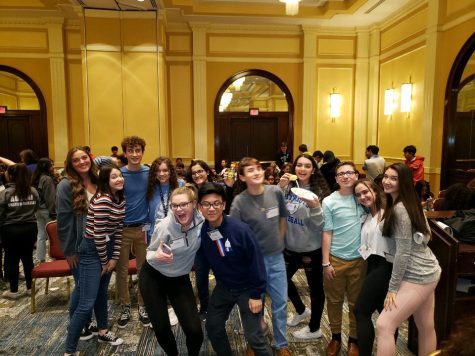
ON: Right, to be able to work and see progress like that is great.
LP: Yeah, definitely. It’s something that I see over the long run, it’s not something I see even within a year of each other. You know, freshman to sophomore year, I didn’t even know there was a change. Now that I’ve totally been through all four years of high school I can really see how much of an impact that really had.
ON: What led you to want to become a leader in JSA?
LP: So, freshman year I was still learning a lot about the structure of the cabinets and the board, MAS, the state, the local, chapter levels. I actually asked the president if I should run for a board position which was pretty ambitious considering that the other people who were running were juniors and I don’t think there had been a freshman running in years. So, I was actually a pretty big underdog in that race, I was really nervous, I wasn’t able to make the nomination ceremony, so that looked really bad on me as well. But when the voting day came, I rallied a lot of underclassmen who had made up a portion of the group and I won by, I think, a vote. It was nerve racking. It was the first leadership position that I’d ever held. I was the state assembly representative. From there, I just kind of met a lot of the other juniors that were in the club at the time and I got a really good hold starting sophomore year how leadership positions go. And from sophomore year to junior year me and Joe went on the same ticket and we both won Co-Presidents. Then this year me and Joe ran against each other, and I was able to thankfully win.
ON: That must have been a huge confident boost to get a leadership position, when you didn’t expect to. That probably helped a lot in your growth in JSA.
LP: Oh yeah, I left the classroom jumping up and down, I was really not expecting to win. I came into that room and I was like, at least I tried and I really learned a lot. You always have to go for something like that and just believe in yourself, even if it doesn’t pan out, keep working at it. So that was something that was important for me, especially freshman year, something that I’ve continued to apply to my life since then.
ON: What does being an effective leader mean to you?
LP: Being an effective leader is being a role model, being someone that is a friend, in a way. I want to make sure that I have that relationship with members. When applying to JSA, it’s someone you can talk to, someone you’re not intimidated by, but also someone that you look up to. I want to be there as a friend and someone you can get a new insight into, like when people ask me what’s your opinion, I know you’re the president of JSA, that’s what I like to hear. I like to know that people want to come to me as a reference and someone who is knowledgeable about a subject. I guess that’s what I feel a leader should be.
ON: Describe the impact that JSA has had on your overall high school experience.
LP: Overall, I’d say JSA, I said it earlier, but I’ll say it again, JSA has made me a better speaker, it’s made me broaden my perspectives. It’s allowed me to meet so many different people. Without JSA, I wouldn’t have met a bunch of people from Texas, people from Guam, North Carolina. It’s made me- it’s hard to describe how much it’s had an impact on my life. It’s really made me more confident in myself. It’s made me more confident about what I say and how I discuss certain issues, especially when it pertains to Global Studies, which is completely affiliated with politics, there’s no way around it.
ON: How important have these relationships that you’ve built through JSA or even Global Studies been in your high school experience?
LP: Throughout JSA, I’ve met people from different places. Which, kind of like meeting people from Italy, it also opened my perspective to how people see things. I mean, we are, here in Freehold Township, this part of Monmouth County is mostly a red environment, within a blue state. I’ve met people from Houston, Texas, who were from a smaller blue environment in a lager red state. So, I see different people, from inner-city kids, kids who live out in the country, kids who have had all different walks of life and what they think, their conservative morals, liberal values, what they think about the government, what they think about patriotism, different aspects that you wouldn’t get just by asking people from our area.
ON: It’s really interesting how, through JSA, we’ve gotten to meet so many people and broaden our perspective about the world in general.
LP: Yeah, that’s definitely been key.
ON: What has been the most surprising element of leading a club at Freehold Township?
LP: Well, I’m looking back to before junior year now because that’s before I took the leadership role. You only view it as something that you see at club meetings. So when you see the president, you think, ok, they’re there at the meeting, they planned out what they wanted to say, they went and said it, then went home and they went through the rest of their day. But there’s so much more behind the scenes, scheduling meetings, talking to advisors, making sure you’re allocating funds properly, different activities, activism ideas, you want to connect different representatives, people to speak with the club. Making sure you have a strong relationship with the members, as well as your board and cabinet because I wouldn’t be anything without the board and cabinet who do so much work. It’s a team of people who need to understand and communicate efficiently and make sure that everyone’s doing their job and if they’re not, then hopping on one another, being like, hey, we have to get stuff done. You know, this is how we’ve got to do it.
ON: What do you see yourself doing after high school?
LP: Ah, the key question. So, I’ve actually thought about this a lot. Obviously, I’m applying to colleges, not even like twenty minutes ago. It’s so difficult for me because, as I said earlier, I love exploring so many different avenues and interests. So, while I say I’m not really sure, I’ve always had an interest in public policy, public administration. So that’s the road that I feel like I’m going down right now. Whether that be a lawyer, I’m not sure yet, that’s something I haven’t really decided upon, but something with international business perhaps. It’s pretty foggy at this moment in time but I wish I had a more clear answer, but unfortunately not quite. I’m still working towards that, if you come back to me in six months, I may have a better answer.
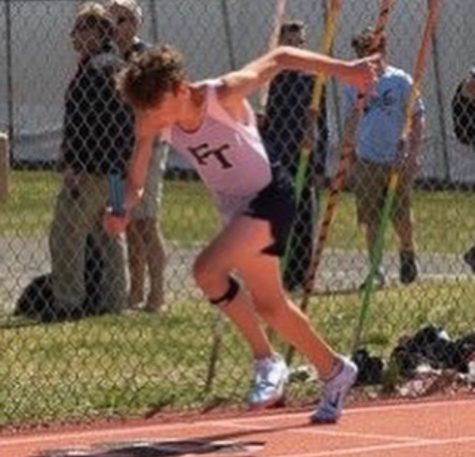
Joe Park
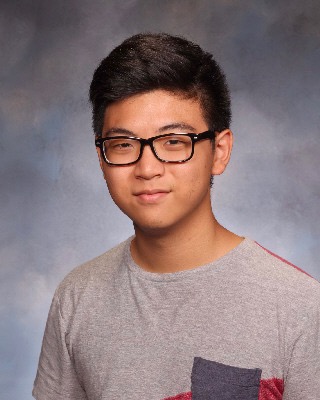
Joe Park is profoundly conscious of the societal problems that are derived from a lack of education. Therefore, he aspires to study education as well as history in college in order to further advocate for an equal access to a quality education and the arts. Joe, who has developed his understanding of politics and leadership through his devotion to JSA as well as other activities, values creating positive impacts on those around him.
Read the full interview below:
Olivia Naum: If you could live anywhere, where would it be?
Joe Park: Hawaii. I like the winter but Hawaii just seems so nice and even though it’s expensive, you’re paying for all the good stuff like the weather, and the furthest you’ll ever be from a beach is like thirty minutes.
ON:What was the most recent tv show that you binge watched?
JP: I’m not really a tv person but the last thing I binge watched was Avatar from the summer.
ON:What is your favorite breakfast food?
JP: Eggs.
ON:What are some other things you think we should know about you?
JP: I’m a really big advocate for the arts and I’m a really big advocate for education and making things accessible for everyone. The arts, a lot of the time, is reserved for people who can afford it. In reality, the arts should be afforded to everyone. Same thing for education, a quality education is only available in wealthier areas, such as ours. But students in lower income urban areas are not afforded a good education even though the government promised that to them.
ON: Besides JSA, what other activities are you a part of?
JP: Mainly I do drama and I am also a part of Global Studies Student Leadership and the Superintendent’s Cabinet.
ON: How have these activities shaped your experience in high school?
JP: I think being a part of drama was just a good way to have fun. You know, it was just really fun. Once again, it really deepened my appreciation for the arts. And you just make a lot of friends, which is fun. I guess being a part of Student Government and the Global Studies Leadership and the Superintendent’s Cabinet, it just feels good to have your voice heard. You know, to have your ideas be out there.
ON: Outside of our school chapter, you have had many opportunities to experience JSA on a larger scale. What were some of the roles that you’ve held in JSA?
JP: Not to brag but, it’s quite an extensive list. I was a CIA agent sophomore year. So basically, let me preface this, JSA has student leadership on the regional level. So sophomore year, I was a CIA agent, junior year I was Director of Expansion, they’re kind of similar but kind of different. So I helped chapters basically, I contacted a lot of chapter presidents, helped them maintain their meetings, and I helped kids start chapters too. Then, I ran for governor, but I lost. But, at the end of the day, I didn’t care if I won or lost because it’s just high school. Not that I don’t care, it was just a good experience. And now I’m the MASChief of Staff, I help plan, I don’t really have a specific role but my role is just a very generic role, where I help plan the events.
ON: Describe what these experiences were like for you. How do you think you grew as a person and as a leader?
JP: I think, in general, it helped me realize, even though the things that we do aren’t exactly politics, we plan conventions, and we fundraise, we do like club things but we do have student elected officials and you realize behind every elected official is a giant team. So politics isn’t just the face, it’s everyone behind the face as well. Junior year, I led a whole department so that really challenged my leadership skills. And I realized that not everyone is receptive in the same way.
ON: We kind of mentioned this before but I wanted to talk about how you ran for governor last year, and I thought your campaign was really great, by the way. So, what do you think you learned about yourself from that experience?
JP: I think I learned that even though- this is going to sound really narcissistic- but even though you may think you have the best ideas in the moment, someone else’s ideas might be better in the long run. I could have a critique on the current student leadership of the MAS because I don’t approve of some of the stuff that they do. You know, at the end of the day, I think the main lesson is that democracy works. Who the people vote for works and I think that’s a lesson that can really be learned during this time.
ON: What was one of the most rewarding experiences you’ve had in JSA, either in our chapter or on the Mid-Atlantic State level?
JP: Honestly, as much as I love politics and as much as I love debating people, at the end of the day, I think I learned that it’s a high school club and it’s a high school organization. We talk about a lot of serious stuff but I think what was most memorable was just hanging out with your friends during the conventions and talking to your friends about political issues during meetings, having thought-talks, just talking to your friends and getting to know them better. At the end of the day, you just learn how to be friends with people through debate and it’s just a fun time. Just friendship, basically.
ON: It’s really important that we’re building these relationships in high school. So, what does being an effective leader mean to you?
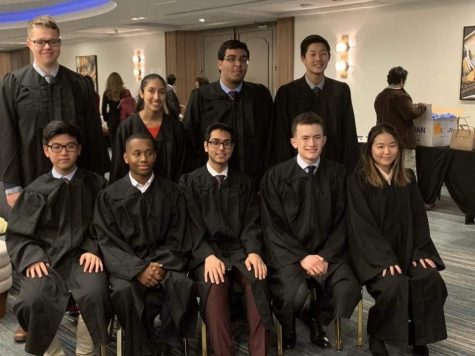
JP: Actually, I’m writing a college essay about this. So, I saw the prompt, and I was like, I think I write about this time because it meant a lot to me. After I lost my election, one of the girls in a different election, a regional election, who was one of my Expansion Agents, she texted me separately and said, I know this is really hard for you but I just wanted to let you know that I really looked up to you this year, like you really helped me out a lot this year, you’ve been an example for me for what it’s like to be a leader. So I think effective leadership is not just about numbers but on the personal level as well. Just getting that text helped me feel better because there were times last year when I was just like, my leadership is absolutely awful, like I suck, I’m letting JSA down. But you know, numbers can say one thing but your effect on a person can say another.
ON:Yeah, even when you don’t get the results you wanted but seeing people reach out and respond to the way you did something, I think that’s really amazing. So, what was the most surprising aspect about being a leader of a club at Freehold Township?
JP: What was most surprising was- I know you want me to answer in one way but I’m going to take it another way.
ON: Go ahead. Take it wherever you want.
JP: I think it was the CoronaVirus, the pandemic happening, it’s hard to keep your motivation up, you know? It’s just like, when everything’s online and we’re not even in school and not even allowed to have in-person clubs or anything. It’s another challenge to your leadership. Despite a pandemic, how will you keep this going? It says a lot about our current administration. Their response was to do nothing because they had no motivation to be proactive.
ON: As a leader, how did you keep the motivation for yourself and for your whole club? Because I feel like you and Luke did a really great job of keeping things going.
JP: Honestly, we were just like, let’s have meetings all the time. I’m going to be really honest, it gets really hard to have meetings virtually, to have the motivation to plan these meetings, because it feels like another zoom, another call of the day. Even though, in the moment, it’s really difficult to have the motivation to do something, but despite the pandemic we know that we want JSA to exist at Township after we graduate. That’s why we’re continuing this. And I want people in future generations of Township to have the opportunity to experience JSA in the same way we did.
ON: That’s really great that you’re trying to keep it going because we see a lot of clubs, as soon as the leaders leave, the club kind of ends. How do you set an example for the younger grades in order to keep the club going?
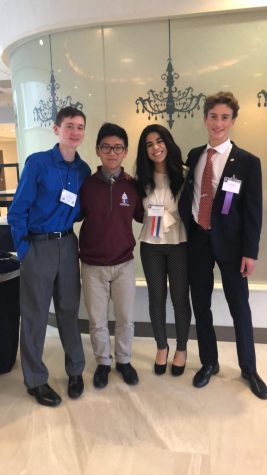
JP: I think this is a challenge that the leadership had last year, during meeting, just disagreeing on stuff. So, I think that I learned that a good example is to literally, in the same way you want to treat others in the way you want to be treated, act in the same way you want to see someone act. You can’t ignore people, yeah like, mind your own business, but act in a way you would want to see yourself act. Be mature. That itself can send a message.
ON: What do you see yourself doing after high school?
JP: I mean, going to college, I guess. I’m applying to college. In college, I want to major in history and education. I’m very interested in education because education is like the one thing that, if we improve it, we can also improve other aspects of society. If we improve education, we have seen that crime rates lower, people are more likely to have successful lives, you know, teen pregnancies drop if we increase education. The achievement for women increases, if we improve our education. A good way of doing that is a history education. I’m just someone who likes history, like I understand our history and I want to be able to teach, where did we go wrong and where do we see ourselves going wrong and what can we do to not let that happen.
ON: Do you think you become interested in education through your own school experiences or outside of school activities?
JP: Both, I think. Being interested in politics has helped me with that because you realize that a lot of these political issues that we are having today stem from a place of miseducation, and not being educated on a lot of things. And also, going through Global Studies, you kind of realize how lucky you are that you have this opportunity. In the program, specifically, we realize that not everyone in the world has this opportunity, there are so many places in the world where people can barely read or they reach a fifth grade education and then are drafted into this terrorist militant group. Or women are told they can’t have an education or they won’t be desirable for men. So, I think it’s a combination of being interested in politics and learning through JSA and also learning through my own educational experiences how lucky I am.
ON: It’s interesting how you can see the culmination of Global Studies, JSA, from these different high school experiences, it’s just all coming together into one idea.
JP: Yeah, if everyone has access to a quality education it would improve literally every or almost every aspect of society.
ON: Yeah, that’s so true. What do you think is going to be the most important thing for everyone to get access to education?
JP: I mean, as much as I am an advocate for everyone in the world having access to education, I think we need to start in our own country first. Everyone has to go to school, we have a ninety-nine point-something literacy rate, everyone can read. But we are still at the same place we were at our country’s founding. Education is only available for wealthy white people. Education for today’s time is only available for wealthy white people. And I say wealthy white people because wealthy people are more likely to be white. The education that poor people got in the 1700s, didn’t get them very far and the education that poor people are getting today is not getting them very far either. Obviously, education is funded through local taxes but I think we need to start with closing that gap in the budget, increasing federal funding to lower income areas, paying teachers in lower income areas the same as teachers in a wealthier area. The more teachers are paid, the more they are going to want to do their job. We just have to start with closing that gap and going from there.
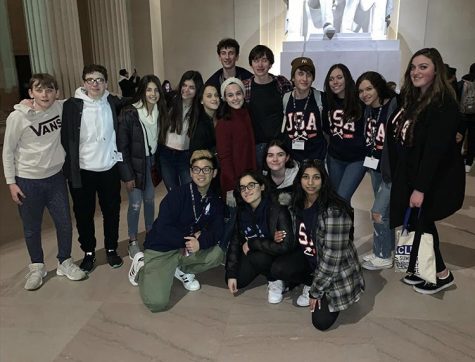
ON: Totally switching gears here, what was one of your favorite high school memories?
JP: My most memorable high school memory is, I guess I would say, going to the homecoming football games. You know, just making friends and hanging out with them. Even something as little as that, just hanging out with friends.